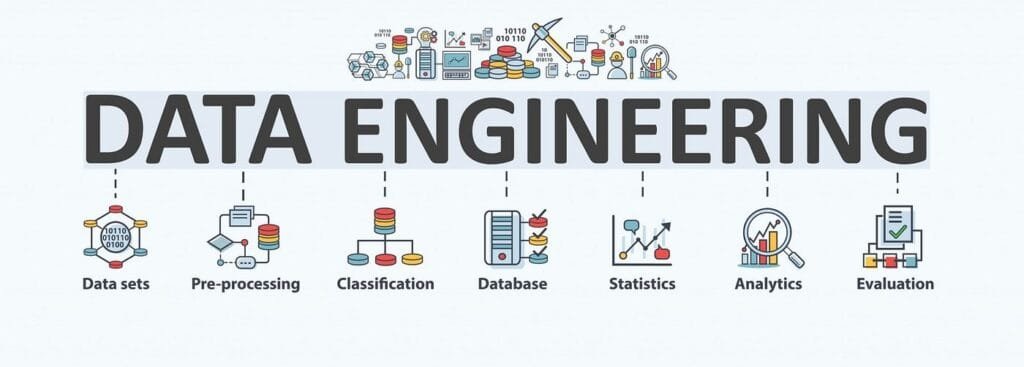Roles and duties of a Data Engineer

Data and its linked professions have experienced a paradigm shift over time. The retrieval of insightful information had previously been the main focus, but data management has recently become more popular. As a result, data engineers’ jobs have gradually gained attention.
A database’s architecture and foundation are built by data engineers. To build a solid architecture, they evaluate a wide range of requirements and use pertinent database strategies. The data engineer then starts building the database from scratch and starts the implementation phase. They also do testing on a regular basis to find any flaws or performance problems. The task of maintaining the database and making sure it runs without any hiccups falls to a data engineer.
The accompanying IT infrastructure comes to a halt when a database malfunctions. When managing large-scale processing systems, where performance and scalability difficulties require ongoing maintenance, a data engineer’s skills are especially necessary.
By creating dataset methods that aid in data mining, modelling, and production, data engineers can assist the data science team. Their input is essential in raising the calibre of the data in this way.
Job Description for a Data Engineer
A data engineer is in charge of gathering, managing, and transforming unprocessed data into knowledge that data scientists and business analysts can understand. Their ultimate objective is to make data accessible so that businesses can use it for performance analysis and improvement.
How Data Engineers Bring Value to Organizations?
The database, which can be SQL Server, Oracle DB, MySQL, Excel, or any other data storing or processing software, is one of the many sources of data that data engineers extract and acquire. In order to make this data valuable and help various departments like marketing, sales, finance, and others increase productivity, they then apply algorithms to it.
An organization’s analytics are under the control of data engineers. Your data is given velocity by data engineers. Businesses struggle to reliably predict indicators like fraud, churn, and client retention in the moment. Data engineers, for instance, can assist an e-commerce company in determining which of its products will be in more demand in the future.
Data engineer certification can handle and use big data as the world transitions to it to generate precise predictions. Data engineers can enhance machine learning and data models by offering tightly controlled data pipelines.
How to Start a Data Engineering Career?
Enroll in a Bachelor’s programme in computer science, mathematics, or another IT-related subject if you want to land a job as a data engineer. Certifications may add even more frosting to the cake. This position calls for a deep understanding of theoretical concepts.
You should be knowledgeable in data warehousing and database systems. Similar to that, you should be able to compare different data stores. Comprehend the differences between relational and non-relational database designs. This requires expertise in both the SQL and NoSQL areas.
Try out personal projects while you’re studying, and find solutions. Start with little projects and apply various concepts one at a time. Participate in open source projects gradually to hone your abilities. The following talents will help you find new opportunities.
Obtaining Certification for Your Career in Data Engineering
The need for data engineer positions has skyrocketed in recent years. To solve their data problems, businesses are actively looking for data engineers. Unlike other fields, where this skill set is far from being oversaturated, it is in great demand. Those who learn these abilities have the chance to earn lucrative salaries. The appropriate certification might be quite helpful for this goal.





